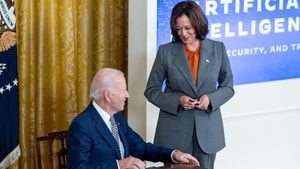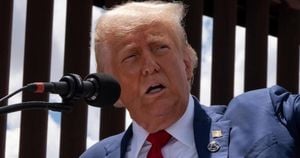Rumors are swirling about the potential lineup for Trump’s cabinet as the political world watches closely for any announcements. Among the names floating around is Dr. Ben Carson, the esteemed neurosurgeon and former Department of Housing and Urban Development secretary. Sources suggest Carson is eager to take on the role of Secretary of Health and Human Services (HHS) under President-elect Donald Trump. Carson, who previously served from 2017 to 2021, is said to be advocating for this new position, with his associates reportedly pushing for him.
Carson was seen on the campaign circuit actively supporting Trump, including appearances at key events such as the Republican National Convention and election night celebrations. His enthusiasm for health-related policies, particularly those aligning with conservative values, has positioned him as quite the contender for the HHS role. Sources close to the transition team hinted at Carson's strategic positioning, even though the official selection process remains pending.
But Carson isn't the only name being floated around these political corridors. Oregon’s former Republican Representative, Lori Chavez-DeRemer, is also making waves as she appears to be angling for the role of Secretary of Labor. Despite narrowly losing her House seat during the recent elections, she has garnered some backing from influential union leaders, including Teamsters President Sean O’Brien.
A unique dynamic surrounds Chavez-DeRemer as she has gained recognition as one of the few moderate Republicans willing to embrace pro-worker legislation, even within the Republican-controlled Congress. Her track record reflects her willingness to cross party lines and support initiatives such as the Protect the Right to Organize (PRO) Act and the Public Service Freedom to Negotiate Act, though these measures have encountered significant roadblocks.
Interestingly, O’Brien’s endorsement at the Republican National Convention captured the attention of many, especially since he was one of the few labor leaders addressing the GOP audience. While his support might suggest potential collaboration between organized labor and the Trump administration, Chavez-DeRemer's connection with the Teamsters raises eyebrows among radical-right anti-labor factions wary of her moderate stances.
The political tensions come to life when considering the backlash from fringe anti-labor lobbies like the National Right to Work Committee, which has openly criticized potential union affiliations. Amidst this polarized climate, Chavez-DeRemer's advocacy for worker-friendly policies has sparked both support and resistance from the far-right factions within the political arena.
Meanwhile, Carson's candidacy also raises pertinent questions surrounding HHS’s future direction under Trump. Carson has taken clear stances on contentious issues, particularly when it involves healthcare policies relevant to minors—an area he feels strongly about, especially with regards to sex-change surgeries among minors. This position is echoed by Trump’s sentiments on the matter, where he labeled such surgeries as “child abuse.” Such aligned perspectives could influence the cabinet’s approach to healthcare policies moving forward.
Both Carson’s and Chavez-DeRemer’s growing prominence signals Trump’s quest to curate a cabinet reflective of his administration’s values and challenges previous political narratives—narratives which had often framed the GOP as antagonistic toward labor and healthcare issues. Yet, their nominations should be seen within the cautious lens of realpolitik; can they effectively navigate their respective departments against strong waves of opposition from both labor unions and progressive advocates?
The completed cabinet could very well showcase the internal strife and disagreements within the Republican Party: on one hand, you have Carson and Chavez-DeRemer advocating for worker-friendly initiatives; on the other, fierce opposition from hard-line conservatives and anti-labor groups. This compatibility—or lack thereof—will be closely monitored as Trump moves toward finalizing his picks.
Although there are no firm confirmations yet, both Carson and Chavez-DeRemer represent the shifting dynamics of Trump's administration. Will their nominations mark the beginning of a new chapter, potentially aligning traditional Republican values with more progressive worker rights, or will they succumb to the pressures of their party’s most radical elements? Only time can tell, but one thing is for sure—the eyes of Washington are glued to the transition team as they finalize their selections.
With Carson focusing on health issues and Chavez-DeRemer emphasized on labor rights, it’s clear these potential appointees could signal both continuity and change within the Trump administration's approach as they navigate the post-election political environment. Their nominations would be more than just personnel choices; they’d be indicators of how flexible the GOP might be moving forward, alongside the pressing challenges of governing.
The cabinet members are expected to influence policy directions significantly, as their backgrounds indicate their own stances on health and labor issues. Carson's tenure at HHS would hold immense power over health policies, especially amid the tumultuous healthcare debates prevalent across the nation. Meanwhile, Chavez-DeRemer’s potential role would provide insight on how labor relations might evolve under the Trump administration, and the balance struck between union interests and Trump’s own ideological base.
There remains considerable speculation about Trump's cabinet, sparking numerous debates across media outlets and among the public. How these figures will fit within Trump's administration remains undetermined, but it is clear they come with distinct backgrounds and experiences.
Eager to reshape the narrative, Trump and his team will likely face pressures from both moderates and radicals, complicate the cabinet selection process and the overall governance strategy. Their choices will be tightly intertwined with both their personal ideologies and the broader objectives set for the administration. The final decision, pending confirmation from the Senate, will also reveal how well Trump attempts to marry the traditional Republican values with changing public expectations around health and labor rights.



